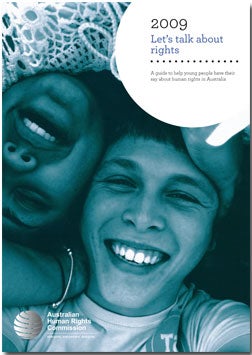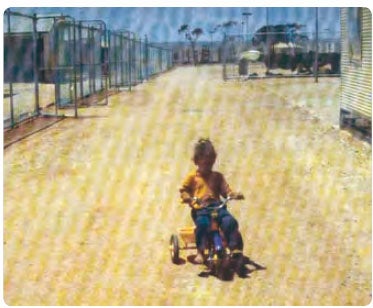Let's talk about rights: A guide to help young people have their say about human rights in Australia (2009)
Let's talk about rights
A guide to help young people have their say about human rights in Australia
2009
Downloads
What
is this guide about?
This guide has been produced by the Australian Human Rights Commission to
help you participate in the Australian Government’s National Human
Rights Consultation.
Throughout this guide we have used examples and stories of real-life human
rights issues in Australia. We hope this information will assist you to make a
submission about the human rights issues that you feel most strongly about. No
matter what your views are, we encourage you to share them during the National
Human Rights Consultation and tell your human rights story.
What
is the National Human Rights Consultation?
The Australian Government wants to hear what all Australians think
about human rights.
To do this the Government has put together an independent Committee to
run a National Human Rights Consultation. This is a team of people who
want to hear from individuals and organisations all around the country –
including young people! The members of the committee include Father Frank
Brennan (a Jesuit priest and lawyer), Mary Kostakidis (a former broadcaster),
Mick Palmer (a former Australian Federal Police Commissioner), and Tammy
Williams (an Indigenous barrister).

The Committee is asking people to make submissions about what they think
about protecting human rights in Australia. The Committee is also running public
meetings in some places so that people can tell them what they think in
person.
This is your opportunity to tell the government directly what you think
about human rights and how you think human rights should be protected in
Australia!
Act now! The Committee is only taking submissions until 15
June 2009.
What
is the Australian Human Rights Commission?
The Australian Human Rights Commission is independent of government. We keep
an eye on how human rights are being protected in Australia. Part of our job is
to help educate people about human rights in Australia. We have been around
since 1986. We are separate from the Committee running the National Human Rights
Consultation.
For more info about the Commission, check out our website: www.humanrights.gov.au or call us on
1300 369 711.
Some of the human rights Australians are entitled to include your right
to:
- live with your family
- a basic education
- be treated equally by the law
- think what you like and practise any religion
- say what you like (without inciting hatred or violence)
- an adequate standard of living, including adequate food, clothing and
housing - access appropriate health care
- maintain your culture and language
- freedom of movement
- privacy
- freedom from discrimination
What
are human rights?
Human rights are important for everyone, everywhere, every day. Human rights
are about making sure that everyone is treated fairly and equally. Everyone who
is human is born with human rights. It is up to governments and individuals to
make sure that these human rights continue to be respected.
The first attempt to make a complete list of human rights was in 1948 just
after World War II. Back then, the world leaders decided that they wanted to
make sure that the human suffering that occurred during the war didn’t
happen again.
Together, they wrote down what they thought were some rights common to all
humans in the world. This international agreement is called the Universal Declaration of Human
Rights.
After they wrote the Universal Declaration on Human Rights, governments
around the world created other international agreements about human rights.
These agreements go into more detail about what human rights are, and how they
should be protected and promoted. Two of the most important ones are the:
- International Covenant
on Economic, Social and Cultural Rights (ICESCR) - International Covenant
on Civil and Political Rights (ICCPR).
The Australian
Government has signed up to all three of these important human rights
agreements. This means that all Australians are entitled to enjoy the
human rights they contain. See the box on the right side of this page for just
some of the rights that each and every one of us is entitled to have protected.
Australia has also signed up to the Convention on the Rights of
the Child. This is a special international agreement which says that
children and young people have specific human rights. For example, children and
young people have the right to express their own views and have them taken into
account by people who make decisions about them.
If you want more information about human rights, check out our website:
www.humanrights.gov.au/human_rights/about_human_rights.html
A true human rights story
A few
years ago a new boy came to my primary school. He was Asian and didn’t
speak much English. At lunch times he stayed by himself eating food that no one
had ever seen before. Some boys started picking on him – calling him
names, throwing rocks at him and pulling their faces so their eyes were
squinting. I knew that it was wrong, the boy was helpless, no one was there to
help him and I’m not sure he even understood what the boys were saying. I
didn’t think there was anything I could do, or maybe I didn’t want
to do anything at the risk of being bullied myself. I watched as the boy was
tormented and just like him felt helpless. I didn’t know what I could do.
I don’t think this sort of bullying is what Australia is supposed to be
about. Racism in the schoolyard should be stopped because it’s just as
cruel and hurtful as racism on a bigger scale.
Claire, 14, NT, ‘Helpless in the playground’, Human Rights and
Equal Opportunity Commission, Voices of Australia 2005, p 43.
Why do human rights
matter to me?
Human
rights affect all of us!
Have you ever heard of a family member or a friend who is upset or annoyed
because they were not treated fairly and equally or given a ‘fair
go’?
Maybe they were upset or annoyed because:
- a school didn’t have enough teachers
- a town didn’t have enough doctors, or any hospitals
- they are in a wheelchair and can’t get inside some buildings or use
public transport - they were bullied at school
- they were ‘moved-on’ from a mall or shopping centre
- they can’t get access to water, food or adequate housing
- someone they know who lives in an aged care facility is not being treated
well.
You might be surprised to realise each of these situations
concerns a human rights issue.
Do any of these problems affect you, your family or your friends? If they
do, write them down and let the National Human Rights Consultation Committee
know!
Do
you want Australia to be a place where everyone gets a ‘fair
go’?
Even if none of the problems above have affected you, your family or your
friends directly, human rights may still be important to you because they affect
other people in Australia.
Do you want Australia to be a place where everyone gets a ‘fair
go’? This will only happen if human rights are protected.
At the moment, people living in Australia still face injustices because of a
number of human rights problems. For example:
- Inadequate access to education – particularly for children in rural
and remote areas, Indigenous children, children with a disability, and children
from diverse cultural, religious and linguistic backgrounds. - Indigenous children in the Northern Territory are three times more likely to
die under the age of one than all other children in Australia. - Some families seeking asylum in Australia were detained in immigration
detention centres for more than three years; one child was detained for almost
five and a half years. - Low youth wages – employers are allowed to discriminate against young
people in terms of pay. This means that a young person with the same skill
level, and doing exactly the same task as another employee who is an adult, can
legally be paid a different amount for that work. - Youth homelessness – one in every two people requesting accommodation
from a homeless service is turned away every day. 46% of those people who are
homeless in Australia are under the age of 25. - Child abuse and neglect – in the last ten years there has been an
increase in reporting to child protection systems. In 2006, 1,530 children died as a result of abuse or neglect. - Limited opportunities for participation – children and young people
are often not able to participate in political and legal decisions which affect
them. - Restrictions on using public space – in most states and territories,
police have broad powers to ‘move-on’ or detain people in public
spaces. These powers disproportionately impact on young people, especially
Indigenous and homeless youth.
The following are real stories of
people in Australia who face human rights problems.
If
you think the Australian Government needs to do more to protect the human rights
of all people in Australia, and help create a fair and just
society, write it down and tell the National Human Rights Consultation!
Real stories of
human rights problems in Australia
A right to education in rural Australia
‘... you’ve got some kids that just can’t get education,
especially in the out-station communities up here. We recognise that the
government isn’t able to provide education services to every little
out-station community that is developed or created. But there are some
out-stations...that have 10 or 20 Aboriginal kids who weren’t receiving
any education at all for a time.’
Ian, Kununurra, Human Rights and Equal Opportunity Commission, Education
Access: National Inquiry into Rural and Remote Education (2000), p56.
A right to freedom of movement for young people
‘We have heard numerous reports of young people being ejected or banned
from shopping centres, often for spurious reasons which would not be applied to
older people. Driving young people away from shopping centres interferes with
rights such as freedom of association and of peaceful assembly and participation
in leisure, recreation and cultural activities. It may also deny them access to
services such as shops, banks, libraries and Centrelink offices. In our view,
such practices are clearly discriminatory and should not be tolerated.’
Youth Justice Coalition in a submission to the Human Rights and Equal
Opportunity Commission, Age matters?: A Report on Age Discrimination (2000), p9.
A right to be free from discrimination
‘One Sunday afternoon I was taking my dog for a walk along the
Tullabudgera Creek on the Gold Coast, like many other families. When I started
to walk toward the beach I heard someone shout, "Let’s paint her white." I
saw other family groups look in the direction of the shouting and when I turned
around to see what the commotion was about I saw a group of people heading
towards me. Panic struck me as I realised that the shouting was targeted at me.
I feared for my life. The group had glass bottles in their hands and they were
coming towards me. I quickly went to my car and drove off. I was afraid that
they might follow me so I headed for the Coolangatta Police Station. I arrived
at the police station to report the incident. I described the vehicle and gave
the licence plate number but was told that no action could be taken unless I was
physically harmed.’
Valma, Mackay Queensland, ‘Walking the Dog’ from Human Rights and
Equal Opportunity Commission, Voices of Australia (2005), p48.
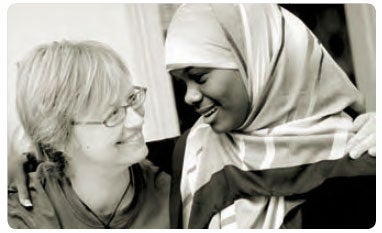
A right for refugees and asylum seekers to be treated with
dignity
Between April and July 2002, a 14 year old boy held at the immigration
detention centre in Woomera attempted to hang himself four times, climbed into
the razor wire four times, slashed his arms twice and went on hunger strike
twice. Psychiatrists pleaded with authorities to release him and his mother from
detention. Two years later, he was finally recognised as a refugee and released.
He now lives in Australia with his family.
Human Rights and Equal Opportunity Commission, A Last Resort? National Inquiry into Children in Immigration Detention (2004),
pp442-444.
A right to adequate housing
‘Homelessness to me was a feeling of death. There is nowhere to go,
no-one to see and no-one who cares. People generally believe you are a bum and
were always meant to live a homeless existence... Beside the feeling of shame
and uselessness is the feeling of terror and hunger. Hunger can turn a person
into a madman. The desire for food greatly exceeds the thought of right and
wrong and in many cases I stole to survive.’
Formerly homeless young person, Human Rights and Equal Opportunity
Commission, Our Homeless Children: Report of the National Inquiry into Homeless
Children (1989), p49.
A right to equality
‘My brother and I were in a store and we were looking at a lap top
computer. Now me and my brother happen to be dark ones. And there in the store
there are school kids walking around the store with bags over their shoulders
and everything. I happened to have my brief case with me and this manager of the
store said over the PA system: "You two blackfellas looking at the lap top,
please move back to the front store where we can remove your bag." I just left
the store mate and never been back.’
“Get a life cobber!” from Human Rights and Equal Opportunity
Commission, Voices of Australia (2005), p49.

Do you have any real stories about human rights problems in Australia? If
you do, write them down so your message reaches the Australian Government
through the National Human Rights Consultation!
Why
are some people’s human rights not protected in Australia?
Often we hear about human rights problems overseas in war zones and in
countries experiencing extreme poverty. But as you’ve just read, human
rights problems also exist here in Australia.
There are a number of reasons why this might be the case. For example, many
people in Australia do not know what their human rights are, and do not know who
can help them solve a human rights problem. Some people also simply do not
respect other people’s human rights.
We think that a major reason why human rights problems exist in Australia is
because the Australian legal system does not adequately protect human
rights.

Australia’s
legal system already protects our human rights ... doesn’t it?
Actually, you might be surprised to learn that in our country there are very
few legal protections of human rights:
- only a few human rights are protected by the Australian Constitution
- some other laws protect our human rights, but only some of our rights, some
of the time.
The laws protecting human rights we have at the moment
are complicated and difficult to find. For most people it’s pretty hard to
know which of our human rights are protected and which ones aren’t.
Did you know the Australian Government can ...
... make laws that breach human rights, for example:
- the law that requires that asylum seekers who arrive without a visa must be
kept in detention - some laws discriminate on the basis of race – such as the laws about
the Northern Territory intervention.
... decide NOT to make laws
that would protect human rights, for example:
- there is very little legal protection against discrimination on the basis of
sexuality - there are no laws requiring paid maternity or parental leave for all
employees.
... decide NOT to consider the needs of the most
vulnerable people in society when deciding how they will do things, for
example:
- government policies about education, health, and housing would be a lot
better if they were developed with everyone’s human rights in
mind.
... breach people’s human rights and get away with
it
people in immigration detention have been subject to inhuman and degrading
treatment.

How
can we better protect human rights in our legal system?
As you have read above, there are some big gaps in the way we protect human
rights in Australia:
- the laws which protect our human rights are scattered all over the
place - the laws which protect our human rights are limited
- our government does not have to think about human rights when it makes
decisions.
We think this situation has to change! What do you
think?
The Australian Human Rights Commission thinks that the best way to protect
human rights is through a national law about human rights, called a Human Rights
Act. This would mean that our government has to think about human rights every
time it makes a decision.
There are many ways in which human rights could be better protected in
Australia. The National Human Rights Consultation Committee wants to hear
people’s views on all sorts of ways. Some options include:
- more protection of human rights in our Constitution
- making Parliament think about whether new laws meet human rights
standards - making sure that government departments consider and respect human rights
when they make decisions - making special laws (for example, laws setting out how people in immigration
detention should be treated, or a law for paid maternity or parental leave) - national programs to help prevent specific human rights abuses such as
violence against women and girls - more public education about human rights
- putting in place specific ways of protecting and promoting the rights of
Indigenous peoples (for example, making sure that Australian laws do not
discriminate on the basis of race) - strengthening the role of the Australian Human Rights Commission (for
example, expanding the types of complaints the Commission can
receive).
Even though all of these things would make a difference,
the Australian Human Rights Commission thinks that right now the best way to
protect human rights is through a Human Rights Act – a national law that
sets out the human rights of all people in Australia.
If you think that we need to better protect the human rights of all people in Australia, write it down and tell the National Human Rights
Consultation Committee!
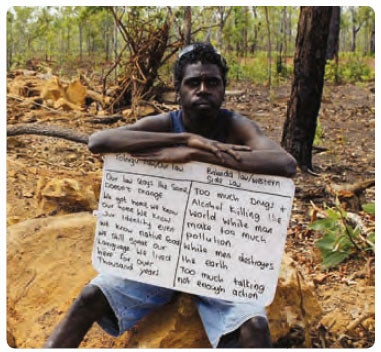
Do
other countries have better protection of human rights than we do in
Australia?
YES! There are heaps of countries all over the world that have a national
human rights law. These include some of Australia’s good friends and
neighbours such as New Zealand, Canada, the United Kingdom and South Africa.
Did you know that Australia is the only liberal democracy in the world
without a national human rights law?
In fact, even within Australia there are state and territory
governments that have Human Rights Acts. If you are from Victoria or the
Australian Capital Territory you are lucky, because both of them have Human
Rights Acts. But they will only protect you within that state or territory and
only for state or territory laws, not laws made by our federal government.
If we had a Human Rights Act, human rights would be better protected
throughout Australia.
What
difference would a Human Rights Act make?
One big difference in places that already have a Human Rights Act is that
governments have been forced to consider human rights when they are making laws
and carrying out their business. This means that a Human Rights Act can help prevent human rights problems from happening in the first place. It can
do this by:
- making our Parliament consider how laws impact on human rights – for example, whether Australia’s immigration detention laws breach
the rights of children - making the federal government respect human rights when developing
policy – for example, whether education policies ensure an equal right
to education for all children in Australian no matter who they are or
where they are - making public servants respect human rights when making decisions and
delivering services – for example government officials would need to
think about the difficulties faced by homeless families in providing proof of
their identity and that they might not have an address to receive letters - making sure there are solutions if a government authority breaches human
rights – for example, a juvenile detention facility may have to
improve their facilities in order to accommodate the special needs of children
and young people.
This would definitely improve the everyday lives
of many people in Australia.
A real story where a Human Rights Act has protected human rights
The United Kingdom has had a Human Rights Act since 1998. The British
Institute of Human Rights tells the story of a woman with mental health problems
who increasingly struggled after her husband died. She was placed in 24 hour
supported care and her children were fostered. It was agreed that the children
could visit their mother three times each week, but these visits were gradually
reduced to one per week because the authority did not have enough staff to
supervise the visits. Both the children and their mother were greatly distressed
by this. The mother’s lawyer noticed that the local children’s
services department was at a meeting to discuss the children’s care, and
that the children’s interests were not being properly represented. The
mother’s lawyer then spoke about the children’s right to respect for
family life and convinced the mental health team to invite children’s
services to the next meeting. The three visits each week were restored as a
result. After this, the manager of the children’s care team personally saw
to it that each visit took place. The mother and her children have remained very
close and were recently able to go on an overseas holiday together.(British
Institute of Human Rights, The Human Rights Act – Changing Lives (2nd ed, 2008), p13).
So, what can I do
about it?
This is your chance to make a difference!
This National Human Rights Consultation is your chance to be heard by the
Australian Government. They are ‘opening their doors’ to you, so
that you can have your say!
Human rights are really important. As you’ve just read, when they are
not fully protected, you, your friends, family, work mates and people who you
see and meet everyday may be affected.
Your views about human rights are really important. Young people are the
future of our country, and it is important that you have your say about human
rights.
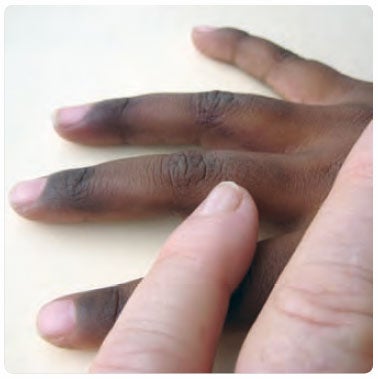
Tips on making a good submission to the National Human Rights Consultation
Committee
We have a fair bit of experience here at the Australian Human Rights
Commission on how to make a submission to the government.
We think the best submissions are those that:
- use personal experiences – so, talk about things that have
happened to you, your family, your friends, work mates or people you see in your
neighbourhood - focus on what you know best – for example, if you are at
school, talk about the human rights issues in your classroom or in the school
yard - say how the situation could have been improved – for example,
explain how this situation or problem would be different if human rights were
respected.
What should I write
about?
The three questions being asked by the National Human Rights Consultation
Committee are:
- Which human rights and responsibilities should be protected and
promoted? - Are human rights sufficiently protected and promoted?
- How could Australia better protect and promote human
rights?
In other words:
- What human rights do I care about?
- Are those human rights respected in Australia?
- Could we do a better job of respecting human rights?
Here
are some questions to help you think about the sorts of things about which you
might like to write to the National Human Rights Consultation.
These questions are suggestions – you do not need to answer all of the
questions in this list to make a submission.
Which human rights and responsibilities should be protected and
promoted?
- Who am I? Where am I from? How old am I? What do I do?
- Why are human rights important to me? Do I think that protecting human
rights will help make Australia a better place?
Are human
rights sufficiently protected and promoted?
- What is my experience of human rights in Australia? Do I know of any human
rights problems in Australia?- What happened?
- What was the impact on me/the people involved?
- What do I think should have happened in this
situation?
- Do I live in a community where there are human rights problems, for example,
limited access to education or healthcare? What would make a difference to my
community? - Do I know of situations where there has been no effective solution to a
human rights problem? - What would be the difference in my life (or the lives of people I know) if
human rights were better protected and promoted?
How could
Australia better protect and promote human rights?
Do I think that human rights should be better protected by law in Australia
or something else, like better education about human rights, or both?

Where
can I find out more?
For more detailed information about human rights generally, visit the
Commission’s website at www.humanrights.gov.au. For more
information about a Human Rights Act for Australia, see Human rights - what
do I need to know? at: www.humanrights.gov.au/letstalkaboutrights/info.
You might also like to have a look at:
- The federal government’s National Human Rights
Consultation
www.humanrightsconsultation.gov.au
- Australian Human Rights Group
www.humanrightsact.com.au/ahrg
- Gilbert + Tobin Centre for Public Law
www.gtcentre.unsw.edu.au/resources/charterofhumanrights
- Human Rights Law Resource Centre
www.hrlrc.org.au
- Public Interest Advocacy Centre
www.piac.asn.au/publications/hrkit
- Amnesty International
http://www.amnesty.org.au/yourhumanrights/comments/20272
- Human Rights Act TV
http://www.humanrightsact.tv/

